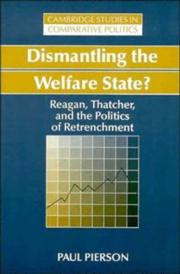| Listing 1 - 10 of 40 | << page >> |
Sort by
|

ISBN: 0198297564 019829753X 9780198297567 Year: 2001 Publisher: Oxford : Oxford university press,
Abstract | Keywords | Export | Availability | Bookmark
 Loading...
Loading...Choose an application
- Reference Manager
- EndNote
- RefWorks (Direct export to RefWorks)
Comparative government --- Welfare state --- #SBIB:316.8H40 --- #SBIB:35H436 --- #SBIB:35H437 --- 330.580 --- 331.31 --- AA / International- internationaal --- NBB congres --- State, Welfare --- Economic policy --- Public welfare --- Social policy --- State, The --- Welfare economics --- Comparative political systems --- Comparative politics --- Government, Comparative --- Political systems, Comparative --- Political science --- Sociaal beleid: social policy, sociale zekerheid, verzorgingsstaat --- Beleidssectoren: welzijn, volksgezondheid en cultuur --- Beleidssectoren: sociale zekerheid --- Gecontroleerde economie. Geleide economie. Welvaarststaat. Algemeenheden --- Economisch beleid --- Microeconomics --- Economic policy and planning (general) --- Comparative government. --- Welfare state. --- Institutions politiques comparées --- Sécurité sociale --- 330.342.146 --- Science politique --- Études comparatives. --- Sécurité sociale.

ISBN: 0191600105 1282007033 0191522910 9786612007033 9780191600104 9780191522918 0198297564 9780198297567 019829753X 9780198297536 019829753X 9780198297536 Year: 2001 Publisher: Oxford [England] New York Oxford University Press
Abstract | Keywords | Export | Availability | Bookmark
 Loading...
Loading...Choose an application
- Reference Manager
- EndNote
- RefWorks (Direct export to RefWorks)
The welfare states of the affluent democracies now stand at the centre of political discussion and social conflict. In this text, an international team of leading analysts reject simplistic claims about the impact of economic globalization.
Comparative government. --- Welfare state. --- State, Welfare --- Comparative political systems --- Comparative politics --- Government, Comparative --- Political systems, Comparative --- Economic policy --- Public welfare --- Social policy --- State, The --- Welfare economics --- Political science

ISBN: 0691117144 0691117152 9780691117157 9780691117140 128325610X 1400841089 9786613256102 9781283256100 9781400841080 6613256102 Year: 2004 Publisher: Princeton Princeton University Press
Abstract | Keywords | Export | Availability | Bookmark
 Loading...
Loading...Choose an application
- Reference Manager
- EndNote
- RefWorks (Direct export to RefWorks)
This groundbreaking book represents the most systematic examination to date of the often-invoked but rarely examined declaration that "history matters." Most contemporary social scientists unconsciously take a "snapshot" view of the social world. Yet the meaning of social events or processes is frequently distorted when they are ripped from their temporal context. Paul Pierson argues that placing politics in time--constructing "moving pictures" rather than snapshots--can vastly enrich our understanding of complex social dynamics, and greatly improve the theories and methods that we use to explain them. Politics in Time opens a new window on the temporal aspects of the social world. It explores a range of important features and implications of evolving social processes: the variety of processes that unfold over significant periods of time, the circumstances under which such different processes are likely to occur, and above all, the significance of these temporal dimensions of social life for our understanding of important political and social outcomes. Ranging widely across the social sciences, Pierson's analysis reveals the high price social science pays when it becomes ahistorical. And it provides a wealth of ideas for restoring our sense of historical process. By placing politics back in time, Pierson's book is destined to have a resounding and enduring impact on the work of scholars and students in fields from political science, history, and sociology to economics and policy analysis.
Political science --- Time --- Sociological aspects --- Political science. --- Sociological aspects. --- Politics --- Science politique --- Temps --- Aspect sociologique --- #SBIB:044.IO --- #SBIB:32H3 --- Administration --- Civil government --- Commonwealth, The --- Government --- Political theory --- Political thought --- Science, Political --- Social sciences --- State, The --- Sociology of time --- Sociology --- Politieke wetenschappen: inleidende werken, handboeken, methoden --- #A0510SO --- Time - Sociological aspects --- Histoire et théorie --- Sociologie --- Aspect politique --- Généralités

ISBN: 128325610X 9786613256102 1400841089 9781400841080 0691117144 0691117152 9780691117157 9780691117140 9781283256100 6613256102 0691117152 9780691117157 Year: 2011 Publisher: Princeton, NJ
Abstract | Keywords | Export | Availability | Bookmark
 Loading...
Loading...Choose an application
- Reference Manager
- EndNote
- RefWorks (Direct export to RefWorks)
This groundbreaking book represents the most systematic examination to date of the often-invoked but rarely examined declaration that "history matters." Most contemporary social scientists unconsciously take a "snapshot" view of the social world. Yet the meaning of social events or processes is frequently distorted when they are ripped from their temporal context. Paul Pierson argues that placing politics in time--constructing "moving pictures" rather than snapshots--can vastly enrich our understanding of complex social dynamics, and greatly improve the theories and methods that we use to explain them. Politics in Time opens a new window on the temporal aspects of the social world. It explores a range of important features and implications of evolving social processes: the variety of processes that unfold over significant periods of time, the circumstances under which such different processes are likely to occur, and above all, the significance of these temporal dimensions of social life for our understanding of important political and social outcomes. Ranging widely across the social sciences, Pierson's analysis reveals the high price social science pays when it becomes ahistorical. And it provides a wealth of ideas for restoring our sense of historical process. By placing politics back in time, Pierson's book is destined to have a resounding and enduring impact on the work of scholars and students in fields from political science, history, and sociology to economics and policy analysis.
Time --- Political science. --- Sociology of time --- Sociology --- Administration --- Civil government --- Commonwealth, The --- Government --- Political theory --- Political thought --- Politics --- Science, Political --- Social sciences --- State, The --- Sociological aspects.

ISBN: 0521403820 0521555701 1316045358 0511805284 Year: 1996 Publisher: Cambridge : Cambridge university press,
Abstract | Keywords | Export | Availability | Bookmark
 Loading...
Loading...Choose an application
- Reference Manager
- EndNote
- RefWorks (Direct export to RefWorks)
This book offers a careful examination of the politics of social policy in an era of austerity and conservative governance. Focusing on the administrations of Ronald Reagan and Margaret Thatcher, Pierson provides a compelling explanation for the welfare state's durability and for the few occasions where each government was able to achieve significant cutbacks. The programmes of the modern welfare state - the 'policy legacies' of previous governments - generally proved resistant to reform. Hemmed in by the political supports that have developed around mature social programmes, conservative opponents of the welfare state were successful only when they were able to divide the supporters of social programmes, compensate those negatively affected, or hide what they were doing from potential critics. The book will appeal to those interested in the politics of neo-conservatism as well as those concerned about the development of the modern welfare state. It will attract readers in the fields of comparative politics, public policy, and political economy.
Great Britain --- Social policy --- 1979 --- -United States --- 1980-1993 --- United States - Social policy - 1980-1993. --- Social Sciences --- Political Science --- Welfare state. --- State, Welfare --- Economic policy --- Public welfare --- State, The --- Welfare economics --- United States --- United Kingdom --- #SBIB:316.8H40 --- #SBIB:328H214 --- Sociaal beleid: social policy, sociale zekerheid, verzorgingsstaat --- Instellingen en beleid: Verenigd Koninkrijk --- United States of America
Book
Year: 1884 Publisher: Paris : F. Vieweg,
Abstract | Keywords | Export | Availability | Bookmark
 Loading...
Loading...Choose an application
- Reference Manager
- EndNote
- RefWorks (Direct export to RefWorks)
Book
Year: 1884 Publisher: Paris Vieweg
Abstract | Keywords | Export | Availability | Bookmark
 Loading...
Loading...Choose an application
- Reference Manager
- EndNote
- RefWorks (Direct export to RefWorks)

ISBN: 9780521555708 9780511805288 9780521403825 Year: 1994 Publisher: Cambridge Cambridge University Press
Abstract | Keywords | Export | Availability | Bookmark
 Loading...
Loading...Choose an application
- Reference Manager
- EndNote
- RefWorks (Direct export to RefWorks)
Book
Year: 1995 Publisher: Bremen
Abstract | Keywords | Export | Availability | Bookmark
 Loading...
Loading...Choose an application
- Reference Manager
- EndNote
- RefWorks (Direct export to RefWorks)
Book
Year: 1884 Publisher: Paris F. Vieweg
Abstract | Keywords | Export | Availability | Bookmark
 Loading...
Loading...Choose an application
- Reference Manager
- EndNote
- RefWorks (Direct export to RefWorks)
| Listing 1 - 10 of 40 | << page >> |
Sort by
|

 Search
Search Feedback
Feedback About UniCat
About UniCat  Help
Help News
News